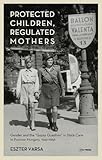Protected children, regulated mothers : gender and the "Gypsy question" in state care in postwar Hungary, 1949-1956 / Eszter Varsa.
Material type: TextPublisher: Budapest ; New York : Central European University Press, 2021Copyright date: ©2021Description: 1 online resource (xii, 244 pages) : illustrationsContent type:
TextPublisher: Budapest ; New York : Central European University Press, 2021Copyright date: ©2021Description: 1 online resource (xii, 244 pages) : illustrationsContent type: - text
- computer
- online resource
- 9633863422
- 9789633863428
- Children -- Institutional care -- Hungary -- History -- 20th century
- Child welfare -- Hungary -- History -- 20th century
- Romanies -- Hungary -- History -- 20th century
- Hungary -- History -- 1945-1989
- Tsiganes -- Hongrie -- Histoire -- 20e siècle
- Hongrie -- Histoire -- 1945-1989
- SOCIAL SCIENCE -- Children's Studies
- Child welfare
- Children -- Institutional care
- Romanies
- Hungary
- 1900-1999
- 362.73/20943909045 23
- HV1160.5 .V37 2021
| Item type | Home library | Collection | Call number | Materials specified | Status | Date due | Barcode | |
|---|---|---|---|---|---|---|---|---|
 Electronic-Books
Electronic-Books
|
OPJGU Sonepat- Campus | E-Books EBSCO | Available |
Includes bibliographical references and index.
"Protected Children, Regulated Mothers examines child protection in Stalinist Hungary as a part of twentieth-century (East Central, Eastern, and Southeastern) European history. Across the communist bloc, the increase of residential homes was preferred to the prewar system of foster care. The study challenges the transformation of state care into a tool of totalitarian power. Rather than political repression, educators mostly faced an arsenal of problems related to social and economic transformations following the end of World War II. They continued rather than cut with earlier models of reform and reformatory education. The author's original research based on hundreds of children's case files and interviews with institution leaders, teachers, and people formerly in state care demonstrates that child protection was not only to influence the behavior of children but also to regulate especially lone mothers' entrance to paid work and their sexuality. Children's homes both reinforced and changed existing patterns of the gendered division of work. A major finding of the book is that child protection had a centuries-long common history with the "solution to the Gypsy question" rooted in efforts towards the erasure of the perceived work-shyness of "Gypsies.""-- Provided by publisher
Description based on online resource; title from digital title page (viewed on April 12, 2021).
eBooks on EBSCOhost EBSCO eBook Subscription Academic Collection - Worldwide
There are no comments on this title.

